Friday, 13 October 2017
GDG DEVFEST 2017 AAUA
Learn, connect, share and create.
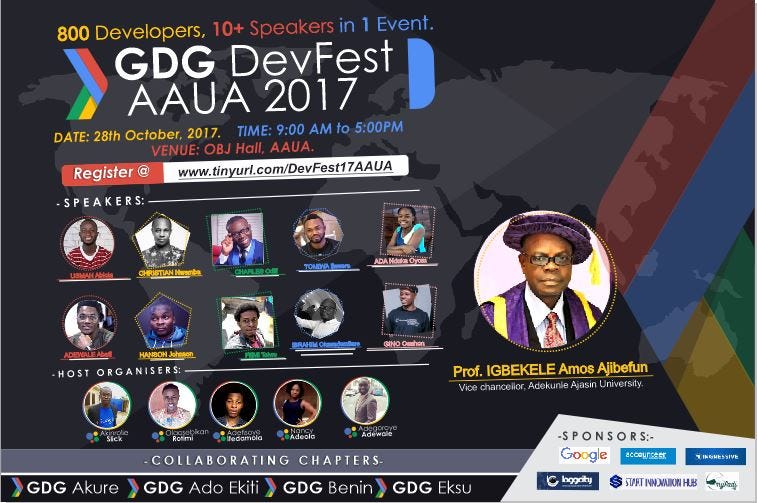
Date: 28th October 2017,
Venue: Obj Hall, AAUA.
Target Audience: Tech enthusiasts, Developers, Entrepreneurs & Others.
GDG DEVFEST
Developer Festivals, also known as DevFest are large events run within or across Google developer communities. These events focus on community building and learning about Google Technologies, platforms & products. They attract large numbers of developers and tech enthusiasts within the radius they run.
This year DevFest will be hosted by GDG AAUA in the South-West region of Nigeria, comprising of four collaborating chapters: GDG Akure, GDG Ado-Ekiti, GDG Benin and GDG Eksu.
The focus of this year’s Devfest will staple around diversification of content.Every technology is essential and trending in its own right. Ranging from New trending Technologies like TensorFlow, Android Thinngs to Artificial intelligence, machine learning, Android and Web all round technologies for UI and UX Design, It all comes down to creating the right content for the next billion users.
Women Techmakers will equally be represented with a collaborative and interactive fireside chat by the Women Techmakers host from each chapters, red-carpet interviews, games and many more exciting stuffs.
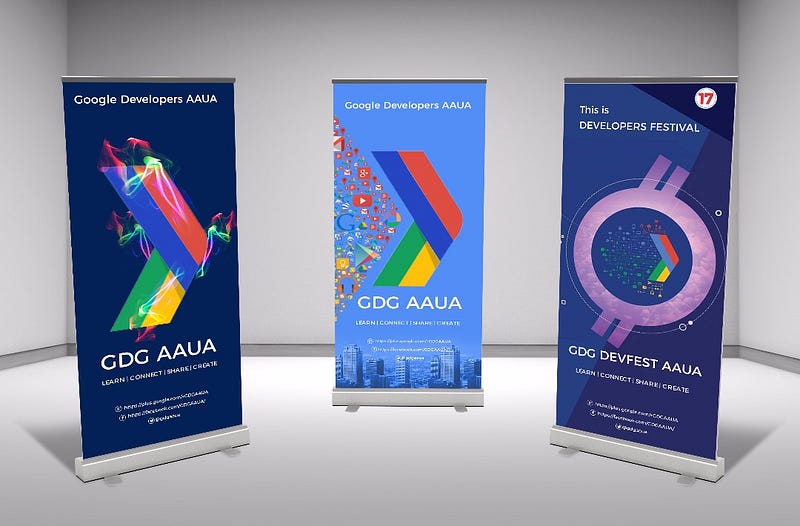
Expectations
Everyone interested in attending GDG AAUA Devfest should expect a series of technical content tailored for the target audience. They will also benefit from a project show case, swag giveaways and a chance to meet some of the greatest minds in the tech industry at the moment.
*Meet Awesome people around you* : You get to meet a lot of inspirational people, you will find yourself around a lot of people having similar interests.
*Networking* : Connect with Google expert and tech experts* around the nation and more
*Get to know about new technologies* : New technologies is what fascinates every developer, I especially enjoyed that part of the event you will get to know about new languages, frameworks, have an hands on experience with some languages or technology.
*Discover yourself*: You will be able to see where you stand among your peers. This will help you to get a direction wherever you will proceed in your career.
TAKE AWAYS:
*Awesome goodies* : I got a slick T-shirt, Stickers, Notepad and some cool goodies so even if you are a complete beginner at least you get these stuffs.
*Awesome food*: Guess what we have got BreakFast and Lunch for you. Awesome food, nice tea break session in the morning and superb lunch at noon and conducted in a reputed place. So you will find a way to satisfy your tummy as well.
Opportunities
● Internship Job
● Student Ambassadorship
Also, Since so much networking happens in GDG DevFests so there is a high probably that you bag an opportunity for yourself. (Pro tip/Sneak Peek: Get in touch with the organizers.)
This will be a wonderful experience as whole, you will definitely learn a lot from an event like this, so in future if you get an opportunity don’t miss out, do attend GDG DevFests.
SPEAKERS
FEMI Taiwo @dftaiwo
· Google dev expert
· CEO Inits
· Lead Organizer GDG Lagos
· Google Cloud expert
HANSON Johnson @nextdeegit
· GDG Mentor Nigeria
· CEO Startup Innovation Hub
· Organizer GDG Uyo
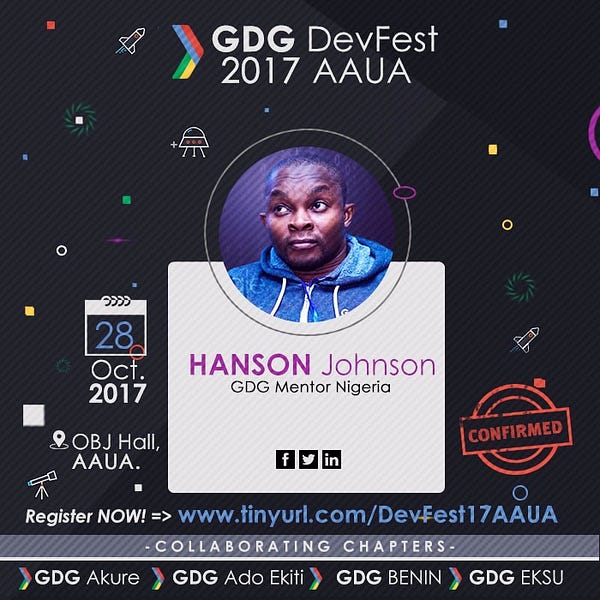
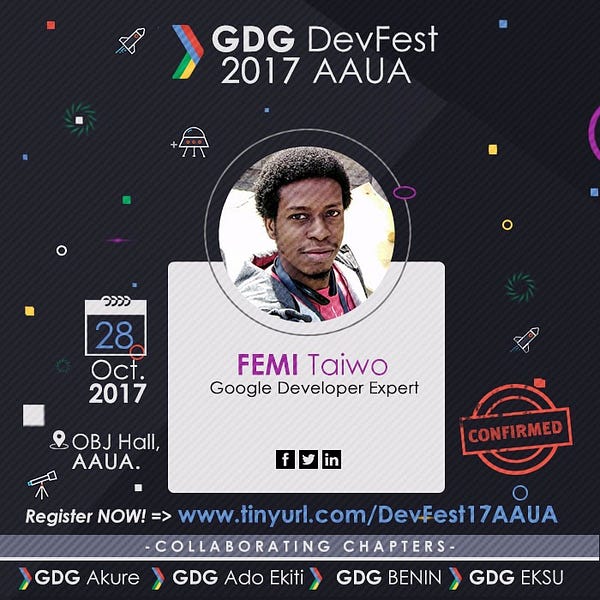
ADA NDUKA Oyom @kolokodess
· Community Relation Manager @Findworka
· Founder, She Code Africa
· Article Writer (Technical and Non-Techinal)
ABATI Adewale @Ace_Kyd
· Developer Advocate @ingression
· Open sorcerer
· Community builder
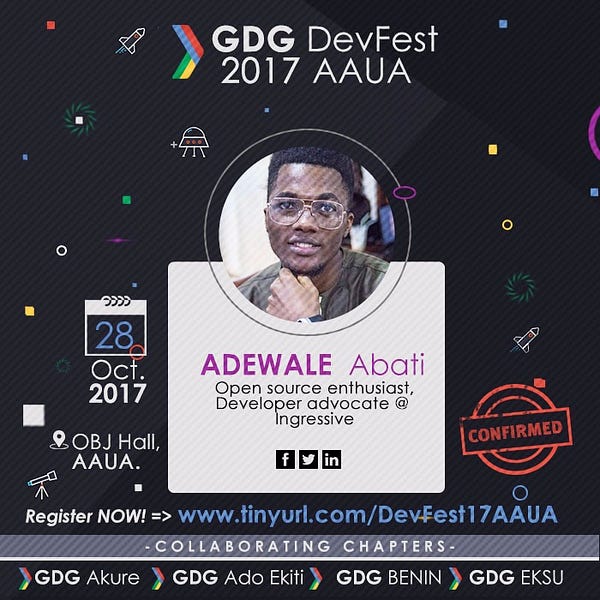
IBRAHIM Oluwadamilare
· Enterprise solution developer
· Cloud expert
· Works at Wragby solutions limited
· Core interest in Web APIs
CHARLES Odili @ochaluwa
· Program designer @Andela
· Former SSA GDG manager @Google
· Started GDG Benin
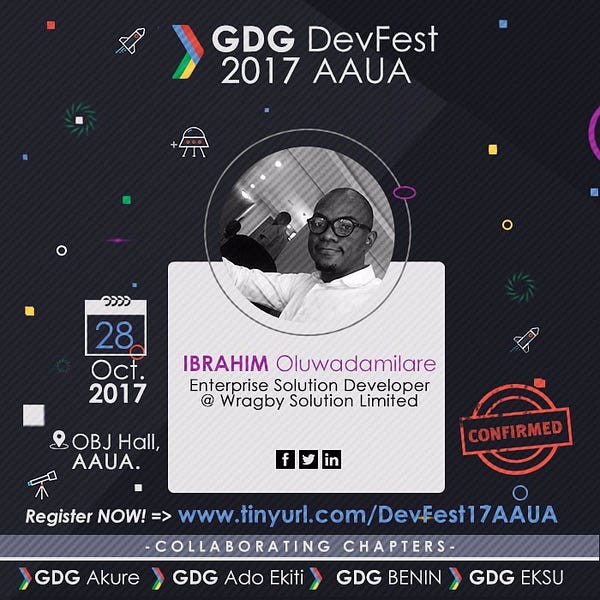
IJAWARE Tomiwa @e911miri
· Machine Learning Expert
· Data Analyst @Mackenzie
· Started GDG Akure
CHRISTIAN Nwamba @codebeast
· Javascript Evangelist
· Open sourcerer
· Community lover
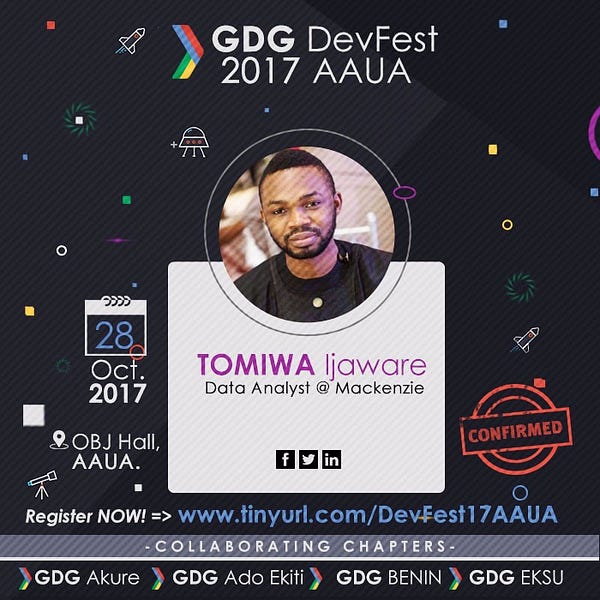
USMAN Abiola @Abiola_Usman
· User Experience Designer @FlutterWave Inc.
· Content Writer
GINO Osahon @Ginowinne
· Developer Evangelist
· Lead Organizer, GDG Port Harcourt
· Centre Manager for Ken Saro-Wiwa Innovation Hub, Port Harcourt
· Advance Android developer

RUKAYAT Sodiq
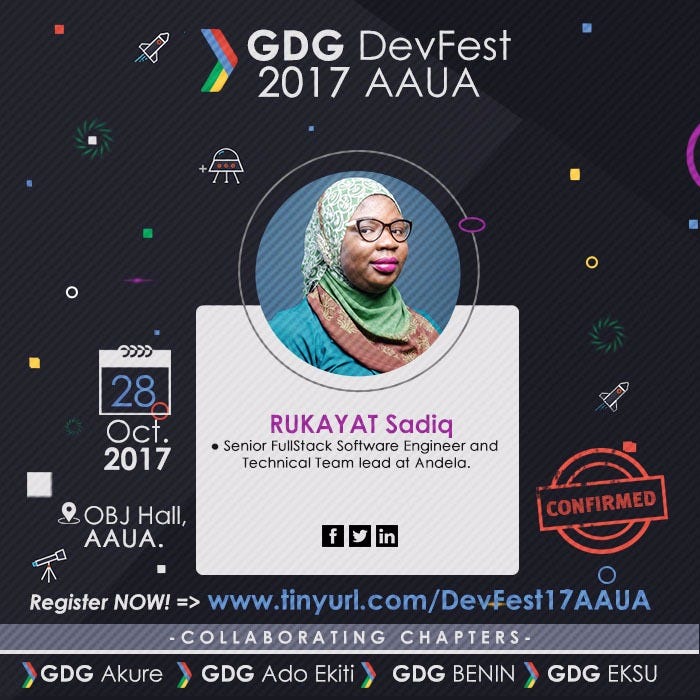
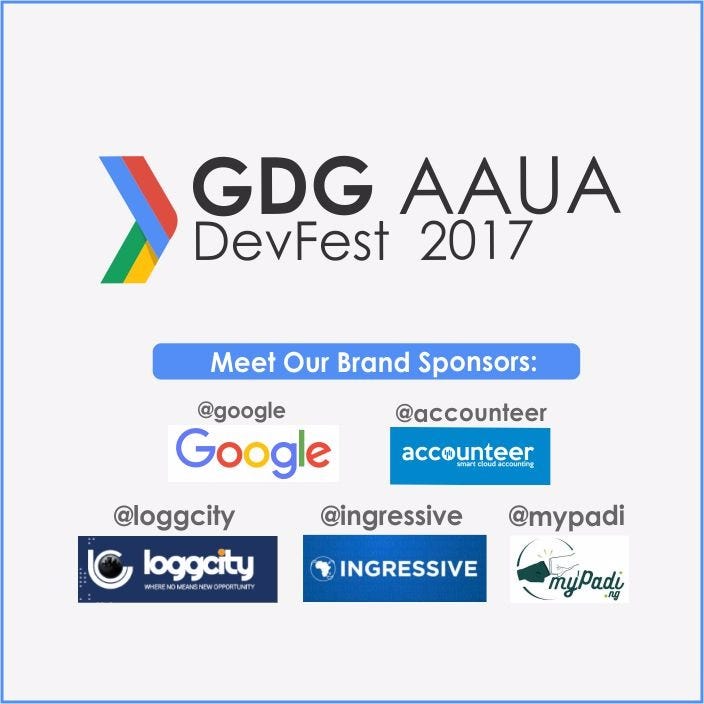
PARTNERS
1. @Ingressive LTD
Ingressive is a tech integration firm, that invests in local startups, expand business operations or reach the African tech-enabled consumer.
Join Ingressive in Nigeria, Kenya, Ghana or South Africa to integrate into Africa’s top tech ecosystems.
Benefits:
· Internship job
· Student Ambassador for each chapter
· Provision of stickers and coupons for github at the event
· Swags/shirt
2. @Loggcity Inc
Loggcity is a business consultancy and digital agency, registered in Nigeria and UK with branches in 3 countries Nigeria, UK and India.
Benefits:
· Recruit Interns and student ambassadors.
· Provision of stickers, notebooks, pens, tshirts and many more swags.
3. @MyPadi
MyPadi helps students to book hostels and find roommates online in few clicks.
Since 2016, MyPadi has been changing how students find hostels in Nigeria.
Benefits:
· Recruit amazing students into the campus ambassadorial program
· Offer internship opportunities to the participants
4. @Accounteer
Accounteer is a cloud accounting solution for SME’s (Small and Medium Enterprises) with a strong focus on Africa.
Benefits:
· Internship
· Swags/Shirt, Notebook, Pen and stickers
5. @StartHub Innovation
This is *Developer Festival*
Learn, connect, share and create.
Credit: Seriki Adeola Esther @seriki_esther
Victoria Erogunaiye and Lateefat Olaide
Special Thanks to @Google for making this happen.
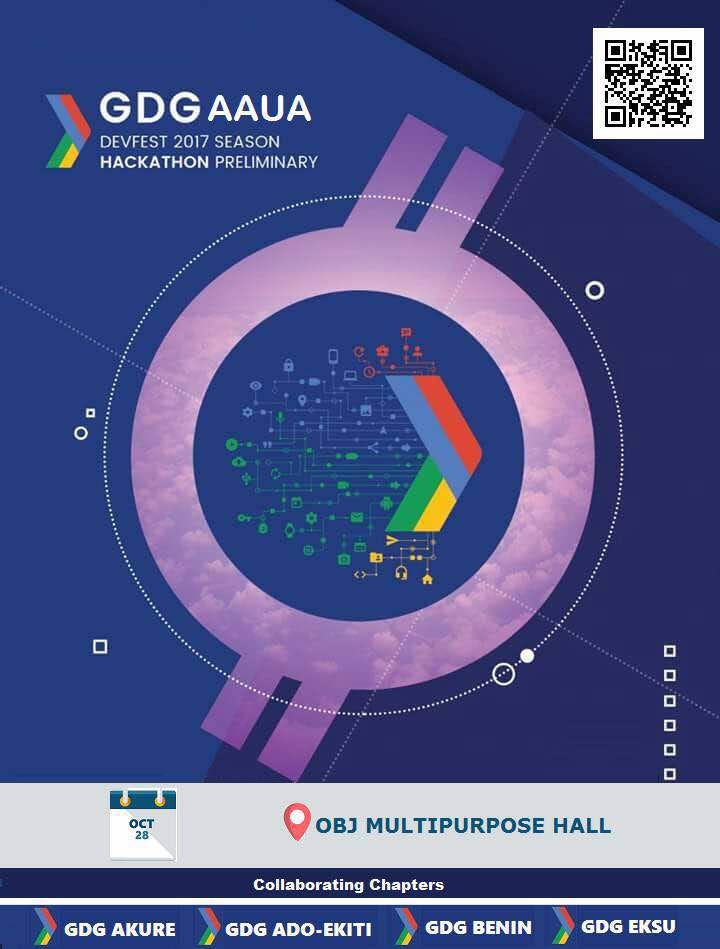
More pictures after the Cut
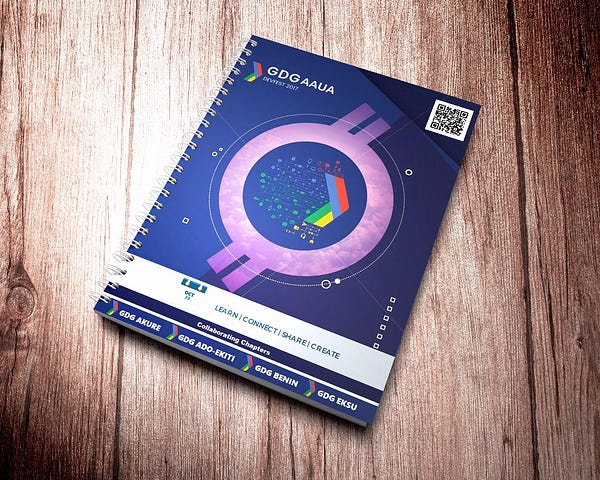
Friday, 28 April 2017
Cloud Next Extended Benin '17
Google Cloud Next 2017 is an immersive event that brings together executives, customers, partners, developers, IT decision makers, and Google engineers to build the future of the cloud. See what's coming from the Google Cloud Platform, G Suite, Maps, and Devices teams.
What was once considered impossible is now being rewritten. Innovation is accelerating because of what cloud can already do — it’s now your imagination that will drive what’s next. Engage with the foremost minds leading the cloud revolution and learn how the modern enterprise is benefiting from the latest in cloud technology in unprecedented ways. Join community of visionaries, developers, tech advocates, enterprise partners, and global customers to build for tomorrow. Now has arrived, at Next.
GDG Benin will be sharing the experience.
Date: Saturday, 29th April 2017 (tomorrow)
Time: 9am
Venue: Blue Meadows (Basement) - University of Benin
Wednesday, 12 April 2017
Google Women Techmaker's , IWD 17'

Google Women Techmakers is Google's platform or for providing community, visibility and resources to tech women.
Every Google Developers Group, has an active Google Women Techmakers community.
The International Women's day is celebrated every year at Google, a day before Google I/O, which is also an annual event where Google Corporation makes announcements on the next big invention to take place. This community is headed by Women Techmakers Leads and we have over a hundred of them all over the world.
In Benin city Nigeria, there is an active Google Women Techmakers community where ladies are given opportunities to showcase their talents, share ideas together and improve their skills and abilities in technology.
The International Women's day celebration with the theme ' Telling Our Story ' holds on the 22nd of April 2017 at The University of Benin, Banquet hall. The time is 10am.
The link for registration is http://bit.ly/2n2xb99
NOTE: Though our main focus is on Women, men are also encouraged to be a part of the community as its a platform for growth and learning in technology.
BE THERE
Tuesday, 24 January 2017
GDG Benin Android for Beginners
GDG Benin in collaboration with NACOSS is bringing Android programming to the University of Benin..lol... Trust me..lots of stuffs to learn... Lots of Google standard Android developer materials to be gotten..swags... Goodies... Foodies....
Monday, 31 October 2016
DEVFEST EKITI 2016
DevFest Ado Ekiti is a large, community-run event which
is organised as a collaborative cluster event among several GDGs in the
south-western region of Nigeria. Last year, this cluster recorded huge success
during a similar event tagged: DevFest Akure. This year’s cluster Devfest is
proposed to be a way better. You are invited to attend. Please click this link
to register: Devfest Ekiti registration link
Thursday, 21 July 2016
Progressive Web Apps
what are Progressive Web Apps, exactly?
“A Progressive Web App uses modern web capabilities to deliver an app-like user experience.” – Progressive Web Apps
Native app store apps do things like send push notifications, work offline, look and feel like an app (as Apple and Google have imagined them), load on the homescreen, and so on and so forth. Mobile Web Apps accessed in a mobile browser, by comparison, historically haven’t done those things. Progressive Web Apps fix that with new Web APIs, new design concepts, and new buzzwords.
To be clear, I’m talking about browser mobile web apps. Hybrid apps, like Ionic with Cordova, run uninhibited in the native app environment, with all the features we expect of any native app. But pull out the web content from a hybrid app and load it in a mobile browser, and the app is thusly constrained by the features of the browser (for a variety of good security and API standardization reasons).
Progressive Web Apps bring features we expect from native apps to the mobile browser experience in a way that uses standards-based technologies and run in a secure container accessible to anyone on the web.
On the whole, Progressive Web Apps describe a collection of technologies, design concepts, and Web APIs that work in tandem to provide an app-like experience on the mobile web. Let’s walk through some of the core tenets of Progressive Web Apps.
Service Workers
Service Workers are an incredibly powerful, and equally as confusing, technology behind a Progressive Web App. They power offline functionality, push notifications, background content updating, content caching, and a whole lot more.
At a high level, a Service Worker is a worker script that works behind the scenes, independent of your app, and runs in response to events like network requests, push notifications, connectivity changes, and more.
I’ve heard Service Workers described as a “proxy,” which I think describes them nicely. We can listen for events like
fetch that happen any time a network request occurs. We can handle that event with full control, checking for cached data and returning immediately, or allowing the request to continue to the remote server. Our script acts as a proxy, or middleware, for the request.
The sheer power and flexibility of Service Workers makes them very complicated, and generally, developers will want to use pre-made “recipes” for common service worker use cases, such as offline mode. Mozilla has a great reference for service worker recipes that demonstrate the myriad applications with reusable code. For example, here’s how to do a simple offline mode that intercepts
fetch events and returns data from a cache if the network request fails. Google also has a slew ofService Worker Samples.
Main takeaway: Service Workers are just a JavaScript file like any other, running in the background and triggered via events, and it’s up to you to write code to handle caching, push notifications, content fetching, etc. Since developers end up using the same “recipes” to do common tasks (like offline support), we will most likely want to use existing recipes to make our lives easier. Service Workers are available on Android with Chrome 50 and not currently supported by other major mobile browsers.
App Shell
The App Shell model is a simple design concept whereby the initial load of a mobile web app provides a basic shell of a app UI, and the content for the app is loaded after. App Shell isn’t a Web API or a framework, but rather a design approach that developers can choose to adhere to that is enhanced by the caching abilities of service workers. You might find that it’s a pretty straightforward, obvious approach, made more dramatic by a buzzword.
With the App Shell model, we focus on keeping the shell of our app UI and the content inside of it separate, and we cache them separately. Ideally, our App Shell is cached such that it loads as quickly as possible when a user visits and returns at a later date. Having the shell and the content load separately theoretically improves the user’s perception of the performance and usability of the app.
Putting this in the context of Ionic, we can load our Ionic app layout immediately (tabs, navigation controller, side menu, etc.), cache it through a service worker, and then fetch and update the content through JS after the app shell has loaded.
As we start to add more PWA support to Ionic, you can expect an App Shell approach to come out-of-the-box for all Ionic apps that are deployed as mobile web apps, with pre-made Service Worker recipes for caching, offline support, and background content refreshing.
Installability and App Manifest
Historically, mobile web apps were not installed like an app to the homescreen. Sure, a user could “pin” a mobile website to their homescreen on iOS and Android, but the experience was second-rate, and the app still did not come with the local features we expect out of native apps (plus, does anyone actually do that?).
This is changing. Recently, Chrome on Android added support forinstalling web apps to the homescreen with a native install banner, just like the native app banners we’re used to.
To tell Chrome our mobile website is installable as an app, we write amanifest.json file and link to it from our main HTML page (see the second link above for a full example).
Currently, iOS doesn’t have any additional features here beyond Pin to Homescreen, so the experience won’t be as fluid, but here’s hoping Apple gives us some goodies this year  .
.
 .
.Conclusion
Progressive Web Apps are equal parts new Web APIs, design patterns, and marketing fluff. The mobile web comes closer to parity with installable app store apps through app manifest and homescreen install support, background worker functionality with Service Workers, faster load time with App Shell, and a renewed belief that web developers, too, can build amazing mobile app experiences.
At Ionic, we believe the web is the future of apps: It runs everywhere, it’s the most widely known technology stack, and it powers a rapidly increasing number of apps. Today, web technologies are used by millions of app store apps, but so far, the mobile web has been a stripped-down experience driving people to the app store for the Real Thing. Progressive Web Apps change that.
In the coming months, we will be releasing new features for Ionic apps that enable developers to get the best of both worlds: cross-platform app store deployment on iOS, Android, and Windows, along with deployment to the mobile web as a Progressive Web App with the same code. Soon, Ionic developers will be able to benefit both from native app store distribution, and immediate access to the billions of mobile web and Google search users. No more clunky app store interstitials, and no more building separate native and mobile web apps. Stay tuned!
article source: http://blog.ionic.io/what-is-a-progressive-web-app/
Subscribe to:
Comments
(
Atom
)





